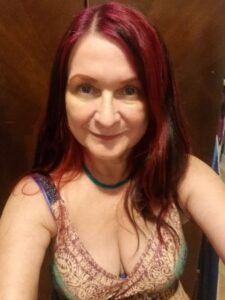Poets of the Dark: Interview with Colleen Anderson

Colleen Anderson is a Canadian author writing fiction and poetry and has had two collections and over 300 poems published in such venues as Grievous Angel, Polu Texni, The Future Fire, HWA Poetry Showcase and many others. She is a member of HWA and SFPA and a Canada Council grant recipient for writing. She has performed her work before audiences in the US, UK and Canada and has placed in the Balticon, Rannu, Crucible and Wax poetry competitions. Colleen also enjoys editing and co-edited Canadian anthologies Playground of Lost Toys (Aurora nominated) and Tesseracts 17, and her solo anthology Alice Unbound: Beyond Wonderland was published by Exile Books. She has served on both Stoker Award and British Fantasy Award juries, and guest-edited Eye to the Telescope. Her latest collection, The Lore of Inscrutable Dreams, will be released June 3.
What sparked your interest in horror poetry? Was there a particular event or work that inspired you to delve into the darker side of poetry?
My mother would take us to drive-in movies when I was a kid (yes, I’m old enough to remember them). Vincent Price, bleeding walls, vampires. Then when I was a teenager I worked at a repertory cinema: vampires, Marx Brothers, Peter O’Toole, aliens. Plus I took this cinema history course in art college where the instructor put on old silent movies and played the piano to accompany them: werewolves, starving people, Douglas Fairbanks.
Interspersed with this seeding was a childhood of fairy tales, Edgar Allan Poe, Hans Christian Andersen (my fave tale has the match girl die at the end), and Ray Bradbury plus a trail of SF books that my older brother left behind. I guess it was bound to happen. Poetry began as angsty teenage stuff, coupled with an abusive home. When I started submitting fiction and poetry, editors would reject my work because they didn’t accept horror. I sort of fell into it.
Can you describe your creative process when writing horror poetry? Do you have any rituals or techniques that help you tap into your darkest fears and bring them to life on the page?
I have no rituals, except for taking chocolate into my body so that I can be one with the chocolate god. I mostly think what-if, or what is the antithesis of this? What are our fears as the human race? Intrinsically most fears boil down to the other. Being the other, being consumed by the other, losing sense of self. Oh and sociopaths and bugs. They’re both alien in different ways.
I always carry paper and pen and the first versions of a poem start often as questions and images, points written out, before the poem evolves into lines that then have to be formed and chiseled into something good.
How do you balance the need to be evocative and disturbing with the constraints of poetic structure and form? Are there any particular strategies you use to create tension and build suspense in your horror poems?
Spacing, punctuation and enambment are important in poetry. As well as the compact image you have to convey in a few words. I will play with the order of the words, try to think of new or unusual imagery and pay careful attention as to where I break a line, or how far I indent it, which can add suspense or tension. I also will cut out punctuation (often) for a running stream of thought or breathless feeling, as well as removing the extraneous little words and conjunctions to build up the punch.
Who are some of your favorite horror poetry inspirations? Are there any authors or poets whose work you admire and draw inspiration from when crafting your own dark verse?
Favourite writers. It goes in streams. I try to read what the current poets are writing. Anyone who only reads the dead poets is limiting the true scope of the word, which has continued to evolve since proto-humans grunted out their first feelings and expressions. Dylan Thomas, while not horror, does still rate as one of my favourite dead poets. Edgar played his part as well. The SFPA (Science Fiction and Poetry Association) is a great place to read what is current as is the HWA. There are a myriad of good publications publishing some interesting poetry and some experimental forms. I really take inspiration from everywhere. I often write ekphrastic poetry, based off of other forms of art from other poets, fiction writers, the world around me, dances, songs, paintings, you name it. There is a whole dynasty of art created and inspired by other art. Its own lineage so to speak. So really, even the bad poets can inspire. 🙂
Finally, what advice would you give to aspiring horror poets who want to explore the genre? Are there any particular challenges or pitfalls they should be aware of, and how can they overcome them to create truly terrifying poetry?
It’s extremely important to be familiar with the genre. Otherwise you waste your time and the editor’s time. Publishers have seen so very many variations on them that you have to soar above the rest. Tropes are good and bad. Bad: they’ve been done to death. Good: they are jumping off points to think farther. Then of course, you can create something completely new but it’s hard. HWA and SFPA again list yearly winners of poems and collections and buying some of these collections is one way to see what people currently like and some of the themes that are explored. Continue to write and read and attend workshops and panels. Absorb it all like The Blob.



